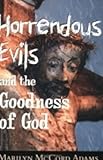Horrendous Evils and the Goodness of God / Marilyn McCord Adams.
Material type: TextSeries: Cornell Studies in the Philosophy of ReligionPublisher: Ithaca, NY : Cornell University Press, [2018]Copyright date: ©2000Description: 1 online resource (240 p.)Content type:
TextSeries: Cornell Studies in the Philosophy of ReligionPublisher: Ithaca, NY : Cornell University Press, [2018]Copyright date: ©2000Description: 1 online resource (240 p.)Content type: - 9781501735929
- God -- Goodness
- Good and evil
- Theodicy
- Philosophy
- Religious Studies
- PHILOSOPHY / Religious
- Religion
- being a good person
- bible analysis
- bible studies
- biblical horrors
- books for bible study
- books for christians
- books for seminary students
- christian philosophy
- christian solution to evil
- christian theology
- comparative religion
- comparative religious studies
- contemporary analytic philosophy
- ethics of belief
- evil according the bible
- evil and the god of love
- evil human nature
- evil in humanity
- evil in practice
- evil people
- existence of evil
- faith in god
- good and evil
- good human nature
- goodness
- justify God
- knowledge of god
- metaphysics
- nature of good and evil
- philosophical debates on evil
- philosophical evil
- philosophical studies
- philosophical theology
- philosophical treatise
- philosophy of evil
- philosophy of good and evil
- philosophy of religion
- problems of evil
- religion and philosophy
- religion studies
- religious metaphysics
- religious philosophy
- religious studies
- the goodness of god
- the nature of evil
- the nature of good
- the praxis of evil
- the problem of hell
- theodicy
- theological discourse
- theological studies
- theology and the problem of evil
- theology
- what is biblical evil
- why does god allow evil
- 214 22
- BJ1401 .A435 2000eb
- online - DeGruyter
| Item type | Current library | Call number | URL | Status | Notes | Barcode | |
|---|---|---|---|---|---|---|---|
 eBook
eBook
|
Biblioteca "Angelicum" Pont. Univ. S.Tommaso d'Aquino Nuvola online | online - DeGruyter (Browse shelf(Opens below)) | Online access | Not for loan (Accesso limitato) | Accesso per gli utenti autorizzati / Access for authorized users | (dgr)9781501735929 |
Browsing Biblioteca "Angelicum" Pont. Univ. S.Tommaso d'Aquino shelves, Shelving location: Nuvola online Close shelf browser (Hides shelf browser)

|

|

|

|

|

|

|
||
| online - DeGruyter Ravishing Tradition : Cultural Forces and Literary History / | online - DeGruyter Perilous Chastity : Women and Illness in Pre-Enlightenment Art and Medicine / | online - DeGruyter Alfonso X, the Justinian of His Age : Law and Justice in Thirteenth-Century Castile / | online - DeGruyter Horrendous Evils and the Goodness of God / | online - DeGruyter Toxic Exports : The Transfer of Hazardous Wastes from Rich to Poor Countries / | online - DeGruyter The Transformation of American Air Power / | online - DeGruyter Winners without Losers : Why Americans Should Care More about Global Economic Policy / |
Frontmatter -- Contents -- Acknowledgments -- Introduction -- Part One. DECONSTRUCTING A PROBLEM -- Part Two. CONCEPTUAL ENRICHMENTS -- Part Three. RESOLUTION AND RELEVANCE -- Conclusion: Horrors, Disruptive and Disrupting -- Works Cited -- Index
restricted access online access with authorization star
http://purl.org/coar/access_right/c_16ec
If you thought nothing new could come of the stalled, stale debates in analytic philosophy over the problem of evil, think again. With characteristic elegance and precision, Marilyn McCord Adams decisively advances the discussion by including overlooked problems―notably, the horrendous evils of her title―and overlooked resources―from the Bible and the history of Christian thought.― Kathryn Tanner, University of ChicagoWhen confronted by horrendous evil, even the most pious believer may question not only life's worth but also God's power and goodness. A distinguished philosopher and a practicing minister, Marilyn McCord Adams has written a highly original work on a fundamental dilemma of Christian thought—how to reconcile faith in God with the evils that afflict human beings.Adams argues that much of the discussion in analytic philosophy of religion over the last forty years has offered too narrow an understanding of the problem. The ground rules accepted for the discussion have usually led philosophers to avert their gaze from the worst—horrendous—evils and their devastating impact on human lives. They have agreed to debate the issue on the basis of religion-neutral values, and have focused on morals, an approach that—Adams claims—is inadequate for formulating and solving the problem of horrendous evils. She emphasizes instead the fruitfulness of other evaluative categories such as purity and defilement, honor and shame, and aesthetics. If redirected, philosophical reflection on evil can, Adams's book demonstrates, provide a valuable approach not only to theories of God and evil but also to pastoral care.
Mode of access: Internet via World Wide Web.
In English.
Description based on online resource; title from PDF title page (publisher's Web site, viewed 26. Apr 2024)


